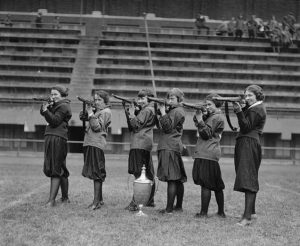Authors throughout North America have identified firearms as important tools that acted to aid their users in more ways than not. Blake Brown argues that they were important for the protection of property, hunting, defense of cattle, and ensuring safety in rural communities particularly (2012). It was essential to every rural household to not only possess a firearm but to also keep stock of ammunition as valuable scarcity. In doing so, this reserved the use of firearms to specific and serious tasks that had the ability to affect the quality of life of the user. In many cases, Firearm’s prior to the 20th century often provided the ability of their users to live longer, happier lives.

Central High School Womens’ Championship Rifle Team, (1922).
With the changing concept of firearms that came with material culture, also came the rise of the outdoorsman. Young men began sport hunting and sport shooting with the aid of literature from authors such as Frank Forester (also know as Herbert Williams) (1875). The outdoorsman and frontiersman began to become a became idols of the American youth, particularly in regards to rural white communities. Play was adapted on the frontier to promote the ability of children to grow into capable woodsman, and with it, they attained firearm knowledge through the idolization of figures such as David Crockett (Elliot 1988). Glenda Riley, notes the power of Annie Oakley as a female figure in creating the identity of the American Cowgirl (1995). The cowgirl being a strong identity in the realm of outdoorswomen, it held great power in pushing the young woman of the country to take part in the newly popularized shooting sports.v
Daniel Herman adds to this, tying hunting to values of American Exceptionalism which we instill, predominantly, in the white middle to upper-class children (2014). This carries with it troubling conditions of race, which Drew Swanson describes in his piece regarding hunting and fishing in the sounds as an act of leisure for white men, and labor for black. African-Americans primarily experience the outdoors as another form of control, especially in the south where white slave owners would leverage their land ownership as a way of controlling African-Americans (2010). Dorceta Tayler explains that in addition to this the conservation movement is scattered with racism and themes of historical conflict (2017).
